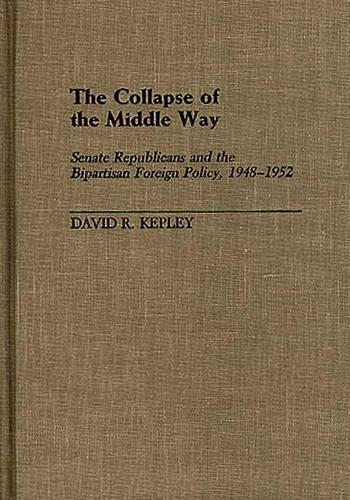
The Collapse of the Middle Way: Senate Republicans and the Bipartisan Foreign Policy, 1948-1952
(Hardback)
Publishing Details
The Collapse of the Middle Way: Senate Republicans and the Bipartisan Foreign Policy, 1948-1952
By (Author) David Kepley
Bloomsbury Publishing PLC
Praeger Publishers Inc
22nd March 1988
United States
Classifications
Tertiary Education
Non Fiction
327.73
Physical Properties
Hardback
214
Width 140mm, Height 216mm
397g
Description
The Truman years saw the beginnings of a dramatic shift in the Republican party's approach to foreign policy and a growing congressional commitment to bipartisanship in foreign affairs. Traditional Republican isolationism, expressed in widespread opposition to overseas political commitments such as NATO and the Marshall Plan, gave way to an internationalist Republican sentiment that called for a militant anti-Communist posture and commitment on a global scale. In this new study, Kepley explains how and why a Cold War consensus developed in the Senate, and he explores the implications of that process for the recurrent conflict between the president and Congress over the conduct of foreign affairs.
Reviews
A survey of the evolution of bipartisan foreign-policy formation growing out of the WWII experience. Kepley treats the early Cold War years and the creation of NATO, the rocky road traveled past the Communist takeover of China, McCarthyism, and the Korean War. Bipartisanship was renewed and strengthened by Eisenhower's victory in 1952; consensus formed around Republic party internationalism and its commitment to contest monolithic communism worldwide. This is a familiar story told in a concise manner. . .-Choice
"A survey of the evolution of bipartisan foreign-policy formation growing out of the WWII experience. Kepley treats the early Cold War years and the creation of NATO, the rocky road traveled past the Communist takeover of China, McCarthyism, and the Korean War. Bipartisanship was renewed and strengthened by Eisenhower's victory in 1952; consensus formed around Republic party internationalism and its commitment to contest monolithic communism worldwide. This is a familiar story told in a concise manner. . ."-Choice
Author Bio
DAVID R. KEPLEY is an Archivist for the National Archives and an instructor at Northern Virginia Community College.
